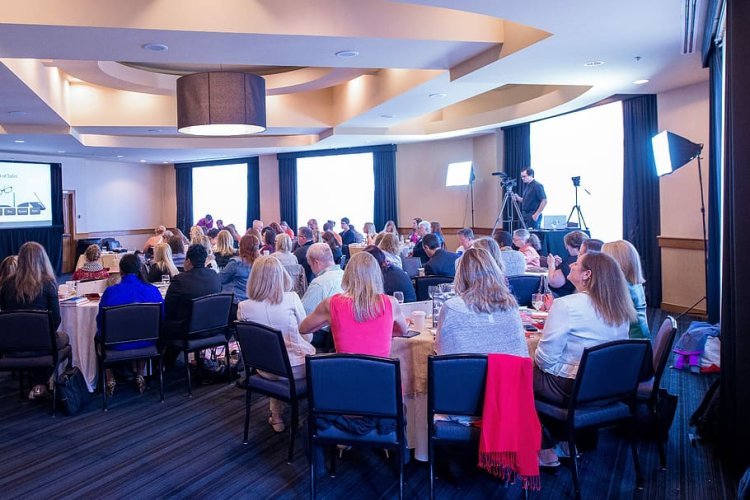3 Conference Marketing Strategies to Drive Engagement and Attendance
This blog will delve into three conference marketing strategies that can maximize attendance, create buzz, and drive participant satisfaction.

Conferences are one of the most powerful platforms for knowledge exchange, networking, and business growth. However, to ensure a successful turnout and meaningful engagement, effective marketing is essential. This blog will delve into three conference marketing strategies that can maximize attendance, create buzz, and drive participant satisfaction.
1. Leverage Content Marketing to Build Hype and Trust
Content marketing is the cornerstone of any successful conference promotion. By sharing valuable, engaging, and relevant content, you can position your conference as a must-attend event.
Steps to Implement Content Marketing:
-
Create a Pre-Event Blog Series Develop a series of blogs highlighting key aspects of your conference. Topics can include:
- Speaker profiles: Share insights about the keynote speakers and their expertise.
- Session previews: Provide a sneak peek into panel discussions, workshops, or special sessions.
- Industry trends: Discuss trends your conference aims to address, positioning it as a cutting-edge event.
-
Video Content for Engagement Video is an impactful medium for grabbing attention and evoking excitement. Create:
- Short teaser videos featuring behind-the-scenes footage.
- Speaker interviews or panel previews.
- Testimonials from past attendees to showcase value.
-
Offer Downloadable Resources Provide resources like whitepapers, eBooks, or infographics that tie into the conference theme. These not only build credibility but also serve as lead magnets for registrations.
-
Engage with User-Generated Content (UGC) Encourage attendees or speakers to share their thoughts on social media using a dedicated hashtag. UGC builds anticipation while amplifying your reach.
2. Harness the Power of Social Media
Social media platforms are indispensable tools for marketing conferences. They help you reach a wide audience, create buzz, and facilitate real-time interaction.
Steps to Create a Winning Social Media Strategy:
-
Define Your Channels and Audiences Choose platforms that align with your audience demographics. For instance:
- LinkedIn is ideal for professional conferences.
- Instagram works well for visual storytelling and engaging younger audiences.
- Twitter is great for live updates and hashtags.
-
Launch a Dedicated Event Hashtag A memorable hashtag makes it easier for attendees to engage with your content. For example:
- Use hashtags like #FutureTechSummit2024 or #MarketingTrendsConf.
- Monitor the hashtag to respond to queries and share attendee posts.
-
Run Targeted Ads Leverage paid promotions to reach specific audience segments. For instance:
- Use LinkedIn ads to target professionals in specific industries.
- Instagram and Facebook ads can focus on demographics, interests, and behaviors.
-
Go Live Live-streaming builds excitement. Use platforms like Instagram Live or LinkedIn Live to:
- Host Q&A sessions with speakers.
- Share live updates from your conference venue setup.
- Preview key topics to spark discussions.
-
Collaborate with Influencers Partner with industry influencers to promote your event. Their endorsement adds credibility and extends your reach to their followers.
3. Focus on Personalized Email Marketing
Email remains one of the most effective marketing channels for conferences. With its high ROI and potential for personalization, it ensures your messaging resonates with the recipient.
Steps to Create a Stellar Email Marketing Campaign:
-
Segment Your Audience Divide your audience into segments based on:
- Past attendance: Send exclusive discounts to loyal attendees.
- Interests: Tailor emails based on their preferences (e.g., specific tracks or speakers).
- Location: Share local travel tips or special hotel deals for attendees traveling from afar.
-
Craft Attention-Grabbing Subject Lines Subject lines are your first chance to capture interest. Examples include:
- “Don’t Miss [Speaker’s Name] at [Conference Name]!”
- “Early Bird Ends Soon – Save Your Spot!”
- “Top 3 Reasons to Attend [Conference Name] This Year.”
-
Provide Value in Every Email Ensure your emails focus on what attendees will gain. Include:
- Key benefits like networking opportunities or professional growth.
- Exclusive updates, such as newly confirmed speakers or agenda additions.
-
Add Countdown Timers Urgency drives action. Include countdown timers to highlight deadlines for early bird registrations or exclusive offers.
-
Incorporate Call-to-Actions (CTAs) Clear CTAs guide recipients toward action. Examples include:
- “Register Now and Save 20%.”
- “Reserve Your Seat Today.”
- “Explore the Full Agenda Here.”
-
Automate Follow-Ups Use automation tools to send reminders, updates, and thank-you emails. Personalize these to maintain a human touch.
Bonus Tips for Amplifying Your Marketing Strategies
Utilize Analytics to Refine Your Approach
Track the performance of your marketing efforts using analytics tools. Monitor:
- Website traffic from specific campaigns.
- Engagement metrics on social media.
- Email open and click-through rates.
Offer Incentives for Early Registrations
Early bird discounts, group packages, or exclusive perks can motivate early sign-ups and provide you with a solid attendance forecast.
Foster a Community Before the Event
Create an online community for attendees to connect, share ideas, and discuss the conference before it happens. Platforms like Slack or LinkedIn groups work well for this.
Conclusion
Effective conference marketing is about more than just getting people to show up; it’s about creating an experience that starts long before the event begins. By leveraging content marketing, social media, and personalized email campaigns, you can not only boost attendance but also establish your conference as a cornerstone event in your industry. Start implementing these strategies today to create a buzzworthy, high-impact conference that attendees will talk about long after it’s over.
What's Your Reaction?
















